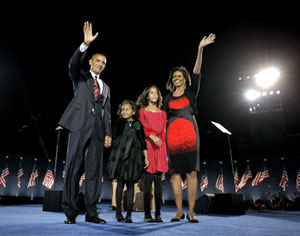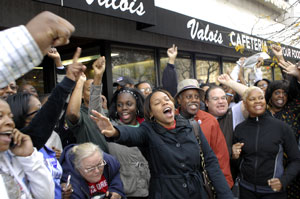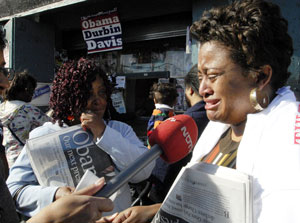ASKIAM
Senior Correspondent
WASHINGTON – Elation. Euphoria. Tears of joy. Barack Hussein Obama was elected President of the United States Nov. 4, 2008.
The date was etched among the most important in American history.
When inaugurated on Jan. 20, 2009–one day after the commemoration of the Martin Luther King Jr. Holiday–Mr. Obama will become the first Black President.

When major television networks declared that he had won more than the 270 Electoral College votes needed for victory, easily defeating Sen. John McCain (D-Ariz.), joyous celebrations began spontaneously throughout the country and the world.
Analysts and observers heaped praise, freely using superlative comparisons.
All across this country, spontaneous celebrations erupted at the news, sweeping over not just Blacks, but among Americans of every race, religion and class, as well as throughout the African Diaspora and among people all over the planet.
More than 700 newspapers worldwide–many of which sold out on the newsstands–lionized the victory with stunning front page pictures and graphics.
Mr. Obama, the first term senator from Illinois, was elected the 44th president, winning a larger share of the popular vote than any Democrat since Lyndon Johnson in 1964. Sen. Obama swept several key battleground states, scoring a landslide victory.
In addition to traditional Democratic strongholds, Sen. Obama and his vice-presidential running mate Sen. Joseph Biden (D-Del.) beat Republican Sen. McCain and Alaska Gov. Sarah Palin in at least nine states that went Republican in 2004: Colorado, Florida, Indiana, Iowa, Nevada, New Mexico, North Carolina, Ohio and Virginia. Mr. Obama also beat Mr. McCain in the swing states of Pennsylvania and New Hampshire, giving him an Electoral College total of 364 to Mr. McCain’s 173.

“It’s been a long time coming, but tonight, because of what we did on this day, in this election, at this defining moment, change has come to America,” Sen. Obama told 250,000 cheering supporters in Chicago’s Grant Park election night.
“I was never the likeliest candidate for this office. We didn’t start with much money or many endorsements. Our campaign was not hatched in the halls of Washington; it began in the backyards of Des Moines and the living rooms of Concord and the front porches of Charleston. It was built by working men and women who dug into what little savings they had to give $5 and $10 and $20 to the cause.
“The road ahead will be long. Our climb will be steep. We may not get there in one year or even in one term, but America, I have never been more hopeful than I am tonight that we will get there. I promise you, we, as a people, will get there,” he said in terms reminiscent of the last speech of Dr. Martin Luther King Jr., who was assassinated in Memphis 40 years and seven months earlier.
Sen. Obama won 52 percent of the record 136 million votes cast, compared to 46 percent for Sen. McCain. Overall turnout was estimated at 64 percent, the most in a century. The total eclipsed the record 122 million votes cast in 2004.
According to an Associated Press poll, more than six in 10 voters listed the economy as their top concern. Ten percent of voters cited the Iraq war, while nine percent said terrorism and another nine percent said healthcare.
Mr. Obama’s political coattails were also long. Along with his victory, Democrats picked up 19 House seats and at least five additional Senate seats adding to their majorities, paving the way for new policies in keeping with the candidate’s campaign promises. In addition, Democrats won seven of 11 contested governor’s races.
Praise and congratulations came from all quarters. “In a contest as long and difficult as this campaign has been, his success alone commands my respect for his ability and perseverance,” Sen. McCain told his supporters in Phoenix. “But that he managed to do so by inspiring the hopes of so many millions of Americans who had once wrongly believed that they had little at stake or little influence in the election of an American president is something I deeply admire and commend him for achieving,” Mr. McCain continued. “This is an historic election, and I recognize the special significance it has for African Americans and for the special pride that must be theirs tonight.”
Secretary of State Condoleezza Rice, the first Black woman to serve as the nation’s top diplomat called the president-elect “inspirational,” saying his election marked “an extraordinary step forward” for race relations. She was filled with pride, she said, even if they belong to opposing political parties.

“This was an exercise in American democracy of which Americans across the political spectrum are justifiably proud,” Ms. Rice told reporters, according to published reports, as she prepared to travel to the Middle East.
In the face of the Obama landslide, there were comparatively, few election glitches or voting problems, and there was apparently no evidence of the so-called “Bradley effect,” in which Whites mislead pollsters about for whom they intend to vote. Instead, national and state pre-election polls were generally accurate in reflecting voters’ preferences in the presidential contest.
The phenomenon is named after former Los Angeles Mayor Tom Bradley, a Black man, who in 1982 lost the race for California governor after leading in the polls. There were similar contests over the following decade in which Black candidates facing White opponents had comfortable leads in polls, only to lose or narrowly win elections.












